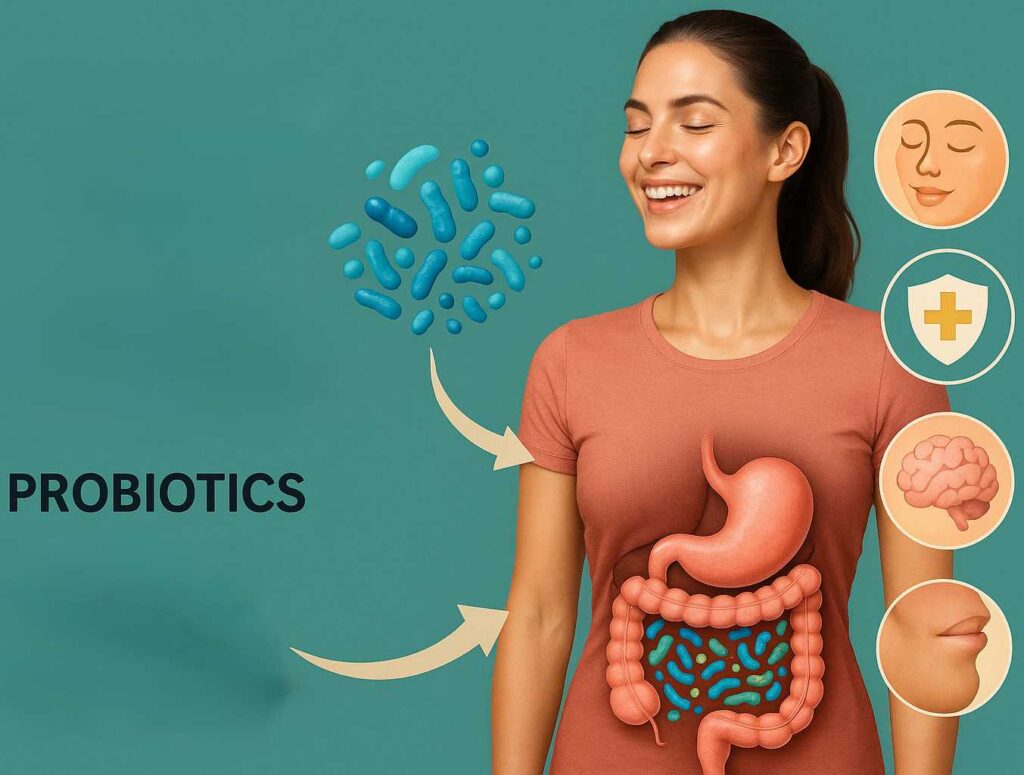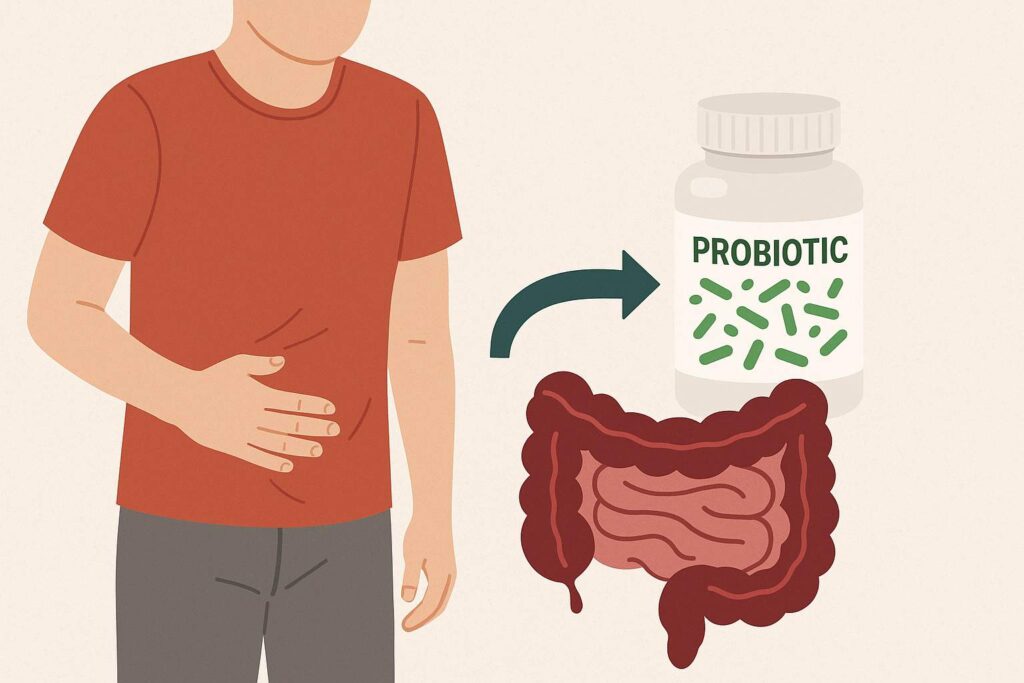Probiotics are live, friendly bacteria and yeasts living in your gut that may support
your overall health and wellness. Various clinical research studies have shown that
probiotics are good for your digestive health, immunity, nutrient absorption,
inflammation, allergic reactions control, mental and skin health, weight management,
and metabolic diseases (diabetes, heart health, hypercholesterolemia).
What are the benefits of taking a probiotic?
Gut Health, Digestion & Microbiome Support
Your gut is home to about 100 trillion microorganisms. Yes, trillion—with more than
2,000 different species! Probiotics work hard to keep this community balanced. They
fight off harmful pathogens by producing substances like lactic acid, helping
maintain balance in your digestive tract.
A review of 13 human clinical trials confirmed that probiotics are safe and helpful in
easing diarrhea and the discomfort it brings. A meta-analysis shows that probiotics
significantly improved stool consistency, reduced abdominal pain and bloating, and
overall constipation-predominant irritable bowel syndrome (IBS). The comparison of
the found Bacillus coagulans is a prominent probiotic with high efficacy in treating
the IBS problem.
Among 43 clinical trials, Bacillus coagulans stood out as particularly effective for
managing IBS symptoms. The evaluation concludes that probiotics are safe and
effective for improving diarrhea and related discomfort.
Researchers at the National University of Singapore recently highlighted specific
strains—like Saccharomyces boulardii, Lactobacillus reuteri, and Lactobacillus
rhamnosus GG as top choices for improving acute digestive outcomes in children,
especially after infections, antibiotic-associated diarrhea, and Clostridium difficile
diarrhea.
Immune System Regulations
Your immune system is your body’s personal army, and probiotics help train and strengthen it! They enhance the activity of immune cells by
- Increase the activity of macrophages or natural killer (NK) cells
- Modulate the secretion of immunoglobulins or cytokines,
- Strengthening the gut epithelial barrier
- Alter the mucus secretion
- Competitive knock-out of pathogenic microorganisms.
Here are 6 top-researched probiotic strains with strong immune-supporting powers:
- Lactobacillus rhamnosus GG
- Lactobacillus casei Shirota
- Bifidobacterium animalis Bb-12
- Lactobacillus johnsonii La1
- Bifidobacterium lactis DR10
- Saccharomyces cerevisiae boulardii
They’ve shown antimicrobial effects against bad bugs like Listeria monocytogenes, Salmonella typhimurium, and Candida albicans. Some examples are: Lactobacillus brevis 925A, Lactobacillus fermentum CS5, Lactobacillus johnsonii NCC 533.
In a recent 2025 clinical trial, the probiotic Vivomixx® even improved blood sugar control and boosted beta-cell numbers in children with type 1 diabetes.
Mental Health
Ever heard of the gut-brain connection? Your gut and brain are besties, constantly chatting through different parallel and interactive channels and communication pathway called the microbiota–gut–brain axis. Enter “psychobiotics”— novel probiotics that support your brain and mental well-being.
Use of a single probiotic strain, including Bifidobacterium infantis, Lactobacillus helveticus, Lactobacillus rhamnosus, or a combination of Lactobacillus and Bifidobacterium probiotic strains, may confer significant benefits in the treatment of depressive disorder. A daily intake of Bifidobacterium longum NCC3001 for 6 weeks reduced the perceived stress and improved sleep quality.
Combining Lactobacillus reuteri NK33 and Bifidobacterium adolescentis NK98 probiotic strains reduced depression and anxiety symptoms in 156 healthy adults.
Skin Health
Skin is one of the most vital defense barriers against infections and pathogens in your body. Your skin and gut are more connected than you might think! Thanks to the gut-skin axis, probiotics can help manage skin issues like acne, pigmentation, aging, wrinkles, and dehydration.
Research studies have found some amazing probiotic strains for skin health, including:
- Lactobacillus helveticus NS8 – skin brightening effect by lowering melanin levels.
- Lactobacillus acidophilus IDCC 3302 – may protect against UV damage and support an anti-aging effect.
- Lactobacillus acidophilus KCCM12625P– known for anti-wrinkle effects
- Lactobacillus plantarum HY7714 – known for anti-wrinkle effects.
Oral and topical probiotics are both used for skin health support, although topical probiotics have some concerns regarding their efficacy.
Improve Nutrient Absorption
Adequate mineral or nutrient availability is vital to your body to perform different physiological functions. Nutrient deficiencies can significantly impact your health, leading to various problems. When we eat food, the nutrient absorption process occurs in the small intestine after digestion.
Many probiotics may produce enzymes that increase the bioavailability of minerals. These enzymes break down complex minerals into more absorbable and simple forms. For example, Lactobacillus plantarum, Lactobacillus reuteri, Lactobacillus rhamnosus, Lactobacillus paracasei, and Lactobacillus acidophilus may influence magnesium absorption.
A multi-strain supplement (Lactobacillus plantarum, Lactobacillus acidophilus, Bifidobacterium infantis, Bifidobacterium lactis) clinical trial in children showed a significant increase in calcium absorption.
Weight Management
Probiotic intake may improve energy metabolism, reduce fat storage, and control your appetite. The probiotic efficacy in weight management highly depends on the type of strain that the supplement contains.
Lactobacillus probiotics may help weight loss by increasing gut microbiome diversity and quantity, regulating immune responses, and improving metabolic rates.
It has been witnessed in a clinical trial that probiotic strain Bifidobacterium animalis ssp. lactis 420 (B420) can reduce the storage of body fat mass. Moreover, a combination of B420 with a prebiotic is helpful in weight management in obese people.
UB0316 is a multi-strain probiotic supplement, combining Bacillus, Bifidobacterium, and Lactobacillus species. UB0316 has shown a significant effect in reducing BMI and body weight in obese and overweight people.
Lactobacillus plantarum has shown promising results in significant visceral fat reductions and improved metabolic profiles. A recent systematic review indicates that a combination of Bifidobacterium and Lactobacillus probiotic strains may be helpful in controlling and reducing body weight in obese people.
What do probiotics do to your body?
Probiotic working action depends on the species and strain—it’s like each one has a different mode, shaped by its metabolism, the molecules on its surface, or what it secretes into the gut.
Probiotics, as your gut’s helpers, work in 3 common interesting ways.
First, they help train and modulate your immune system, like tutors helping your body respond better to bugs or allergens.
Second, they interact directly with other microbes in your gut, keeping the pathogens in control and supporting the good microflora.
And third, they influence the gut environment in your intestine by interacting with various substances, like food components or even the metabolic byproducts created by your own body or microbes.
What organs do probiotics affect?
Probiotics play an important role in balancing the physiological microbiota community in your gut, known as “Eubiosis”. This gut microbiota balance is crucial to ensure your normal health. Probiotics directly affect your stomach and intestines. They may indirectly affect the brain, liver, heart, kidneys, and lungs.
How do you tell if you need probiotics?
Your body needs perhaps probiotics when you notice any regular or unusual signs in your body, such as:
1.Do you feel Digestive discomfort?
- Bloating
- Diarrhea
- Constipation
- Excessive Gas
2. Do you face regular Skin problems?
- Acne
- Eczema
- Aging and wrinkles
- Pigmentation
3. You have regular vaginal infection?
4. Are you feeling tired?
5. Are your sugar cravings out of control?
6. Do you have poor oral health, especially bad breath?
7. Brain and mental issues
- Depression & anxiety
- Insomnia
- Poor memory
- Stress
- Lack of concentration and focus
- Mood disturbance
- Do you notice a gain or loss of weight without any intention?
- Does your body have allergic reactions and inflammation?
- Do you feel a weak immune system with frequent illness?
- Do you have food intolerance issues?
- Did you recently take antibiotics?
H2 Frequently Asked Questions (FAQs)
Do you really need probiotics?
If you are generally healthy, you may not really need probiotic supplements. A diet rich in fermented food may provide enough beneficial bacteria and yeasts for your gut. However, a probiotic supplement may offer an extra boost for some individuals, especially those under stress or with gut imbalance.
Do probiotics suit everyone?
Not all probiotics are the same; probiotic strains have different properties and effects. In general, Probiotics are considered safe and potentially beneficial for most healthy individuals. However, individuals with a weak immune system, those who are severely sick, or those who are under particular medical treatment like chemotherapy or recent surgery, must consult with a doctor before taking probiotics. Moreover, premature infants and children also require special consultation before any probiotic supplementation.
Is it good to take probiotics daily?
Yes, probiotic intake every day can be a powerful tool. Your gut microbiome is potentially under stress with a busy lifestyle, external environmental factors, and internal body factors like stress. Taking probiotics daily for general gut health and overall well-being can be beneficial.
Should I take probiotics in the morning or at night?
Taking probiotics on an empty stomach is often recommended, so the optimal time is in the morning due to low acid levels in your stomach. The lower acid levels in the stomach following an overnight fast may improve probiotics’ survival; acidic pH kills many probiotics. However, some experts recommend doing it the night before bed and even at any time of the day.
Why do probiotics not agree with me?
Probiotics may not fit well for everyone due to individual health conditions, especially age, gut balance, and the specific type of probiotic used. Besides, probiotic dosage, strain selection, and storage conditions may also affect fitness.
Can people have bad reactions to probiotics?
Yes, it is possible to get a bad reaction as a side effect in some people. Though probiotics are generally considered safe. However, some common side effects include digestive issues such as stomach pain, bloating, gas, and diarrhea. Skin rashes or allergic reactions are also possible. In most cases, these issues occur temporarily and are automatically fixed as your body gets customized. People with weakened immune systems or certain health conditions should consult a doctor before taking probiotics, as they may be at a higher risk of adverse effects.
Should you drink lots of water with probiotics?
Yes! Drinking plenty of water with your probiotics can help them survive stomach acid and reach your gut with high numbers. It also supports detoxification by helping flush out toxins released during microbiome shifts. Staying hydrated is key to overall gut and body health.
What are the negative side effects of taking probiotics?
The probiotics have some safety concerns, including negative side effects. These may include:
- Allergic reactions
- Digestive discomfort (vomiting, abdominal cramps, nausea, diarrhea)
- Inflammatory bowel disease
- D-lactic acidosis (rare but serious)
- Bloodstream infections (like bacteremia, fungemia, or sepsis)
- Functional disorders (e.g., liver, urogenital, metabolic, neurological, and liver issues)
- Transfer of antibiotic resistance genes



